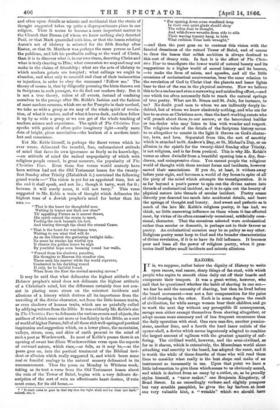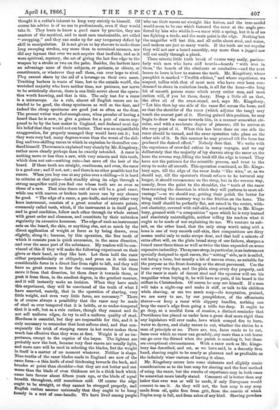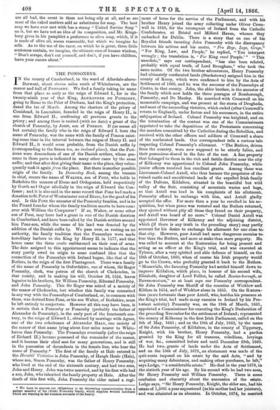RAZORS.
we suppose, rather below the dignity of History to write
upon razors, real razors, sharp things of fat, steel, with which people who aspire to smooth chins daily cut off their beards and exasperate their tempers. It was a great writer, however, who said that he questioned whether the habit of shaving in one sex— we fear he said the necessity of shaving, but then he lived before the beard movement—was not a fair compensation for the pains of child-bearing in the other. Each is in some degree the result of civilization, for while savage women bear their childrenand go to work the next day without any perceptible ill consequences, savage men either exempt themselves from shaving altogether, or adopt means more summary and of less frequent recurrence than the daily operation with steeL One race uses fire, another pumice- stone, another lime, and a fourth the hard inner cuticle of the oyster-shell, a device which seems ingeniously adapted to combine the largest amount of ugliness with the greatest quantity of suf- fering. The civilized world, however, and the semi-civilized, so far as it shaves, which is extensively, the Mussulmen world alone attaching real sanctity to the beard, has adopted the _razor, and it is worth the while of three-fourths of those who will read these lines to consider what really is the best shape and make of an instrument so incessantly in use. Upon that point we have a little information to give them which seems to us obviously sound, and which is derived from an essay by a cutler, or, as he proudly styles himself, a "razor maker," one Benjamin IQugsbury, Bond Street. In an exceedingly verbose sad slightly pompous but very sensible pamphlet, he gives the lay barbers at least one very valuable hint, a "wrinkle" which we should have -thought it a cutler's interest to keep very strictly to himself. Of course his advice is of no use to professionals, even if they would take it. They learn to know a good razor by practice, they are masters of the mystical, and to most men unattainable, art called " stropping," and they can make up for any temporary defect by skill in manipulation. It is not given to lay shavers to make those long sweeping strokes, any more than to untrained oarsmen, nor did any layman that ever we met.acquire that ineffable, and as it were spiritual, mystery, the art of- giving the last fine edge to the weapon by a stroke or two on the palm. Besides, the barbers have an advantage none of their subjects, or patients, or clients, or constituents, or whatever they call them, can ever hope to rival. They cannot shave by the aid of a leverage on their own noses. Teaching barbers is waste of' time, but to the outside world, the wretched majority who have neither time, nor patience, nor nerve -to be artistically shaven, there is one little secret about the opera. lion worth knowing, and that is this. The only test for a razor is a microscope. As a rule, almost all English razors are in- tended to be good, the cheap specimens as well as the dear, and indeed the cheap specimens are good just as often as the dear.. The present writer was fool enough once, when prouder of having a beard than he is now, to give a guinea for a pair of razors sup- posed to be by the best maker in England, and declared next day his belief that they would not cut butter. That was an unjustifiable -exaggeration, for properly managed they would have cut it ; but -they were very bad, many degrees worse than the worst of the shil- ling and two-shilling razors to which in expiation he thereafter con- -fined himself. The reason is explained very clearly by Mr. Kingsbury, rather more clearly perhaps than he exactly intended. A razor is nothing more or less than a saw, with very minute and thin teeth, which does not cut—nothing cuts—but saws off the hair of the 'beard. If *those teeth are straight, continuous, and even, the razor is a good one ; andif not, not and there is no other possible test for -razors. When you buy one at any price over a shilling—it is hard -to criticize at that price—look steadily along its edge through a strong magnifier until you find: one whose teeth are as. even as -those of a saw. That nine times out of ten will be a good razor, while one with uneven or broken teeth never can by any chance lae good. "The edge of a razor, a pen-knife, and every other very keen instrument, consists of a great number of minute points, commonly called teeth, which, if the instrument is in itself good, and in good condition, follow each other through its whole extent with great order and closeness, and constitute by their unbroken regularity its excessive keenness. The edge of such aninstrument acts on the beard, the skin, or anything else, not so much by the -direct application of weight or force as by being drawn, even slightly, along it ; because, by this operation, the fine teeth of -which it consists pass in quick succession, in the same direction, and over the same part of the substance. My readers will be con- vinced of this if they will make the following experiment on their glove or their hand, as they like best. Let them hold the razor either perpendicularly or obliquely, and press on it with some -considerable force in a direct line from right to left, and they will have no great reason to fear the consequences. But let them anove it from that direction, let them draw it towards them, or ;push it from them, in the smallest degree, in the gentlest manner, and it will instantly make an incision. When they have made this experiment, they will be convinced of the truth of what I lave asserted, namely, that in the operation of shaving, very little weight, and even very little force, are necessary." There is of course always a possibility that the razor may be made -of steel so over tempered that it is brittle, or so under-tempered that it is soft, but as a rule cutlers, though they cannot and do not sell uniform edges, do try to sell a uniform quality of steel. Hardness is essential, but they are responsible for this, and it is -only necessary to remember that heat softens steel, and that con- sequently the trick of steeping razors in hot water makes them much less effective than they were at first. Weight is of no im- portance, except to the caprice of the buyer. The lightest are probably now the best, because very dear razors are usually light, and more care will be used in selecting the bladea, b u t the weight in itself is a matter of no moment whatever. Neither is shape. Nine-tenths of the razor blades made in England are now of the same form—a thin knife of steel thickening towards the back, and broader at point than shoulder—but they are not better and not -worse than the blade of even thickness set in a thick back which -came into favour about fifteen years ago, or the blade of' equal breadth throughout, still- sometimes sold. Of course the edge cught to be straight, or they cannot be stropped. properly, and English cutlers assume universally that they ought to be hung Loosely in a sort of case-handle. We have lived among people
who use their razors set straight like knives, and the true model would seem to be one which fastened the razor at the angle pre- ferred-by him who wields it—a razor with a spring, but it is of no use fighting a trade, and the main point is the edge. Nothing but the magnifier will test tide, and all oaths about steel, and water, and makers are just so many words. If the teeth are not regular they will not saw a beard smoothly, any more than a jagged saw will out easily through a plank.
These minute little teeth break of course very easily, particu- larly with men who have stiff beards—beards "with iron in them," the beards of the obstinate or combative—and the next lesson to learn is how to restore the teeth. Mr. Kingsbury, whose pamphlet is marked "Twelfth edition," and whose experience, we suspect, tallies with that of most men who have ever been con- demned to shave in cutlerless lands, is all for the hone—the long bit of smooth porous stone which every cutler uses, and most cutlers will, if you let them, decry. Drop a little oil on that, the olive oil of the cruet-stand, and, says Mr. Kingsbury, "Let him then lay one side of" the razor flat across the hone, and so that the shoulder of the razor (which adjoins the tang) may touch the nearest part of it. Having gained this position, he may begin to draw the razor towards him, in a manner somewhat cir- cular, and witha moderate degree of pressure, till he arrives at the very point of it. When this has been done on one side the razor should be turned, and the same operation take place on the other side of it. In this manner he may proceed till the hone has produced the desired effect." Nobody does that. We write with the experience of crowded cabins in many voyages, and we say deliberately that the majority of lay shavers strop the razor on the hone the reverse way,lifting the back till the edge is turned. They have not the patience for the scientific process, and trust to the strop to make all smooth. This operation continued, as Mr. Kings- bury says, till the edge of the razor looks "like wire," or, as we should say, till the operator's thumb refuses to be tortured any longer, it should recommence on the strop, but in the reverse way, namely, from the point to the shoulder, the "teeth of the razor thus receiving the direction in which they will perform to most ad- vantage "—as we should say, getting their polish the better for being rubbed the contrary way to the friction on the hone. The strop itself should be perfectly fiat, not raised in the centre, with- out elasticity, covered with calf-skin, and according to Mr. Kings- bury, greased with "a composition" upon which he is very learned and absolutely unintelligible, neither telling his readers what it ought to be made of nor explaining its use. We venture to sub- mit, on the other hand, that the only strop worth using with a hone is one of very smooth calf-skin, that compositions are dirty messes useful only to make strops dear, and that half a minute of extra effort will, on the plain broad strop of our fathers, sharpen a honed razor three times as well as twice the time expended on some expensive imbecility. The square strop, in particular, is an instrument specially designed to spoil razors, the "setting" side, as it is called, not being a hone, but usually a bit of uneven stone, as suitable for the purpose as the front doorstep or the street pavement. Use the lone every two days, and the plain strop every day properly, and if the razor is made of decent steel and the operator will use his magnifier when buying it, he will have no pain:, if his beard is the stiffest in Christendom. Of course he may out himself. If a man will take a night-cap and make it stiff, or talk to his children while shaving, or use too much soap—the temptation, praised, we are sorry to see, by our pamphleteer, of the effeminate shaver—or keep a razor with slippery handles, nothing can keep the razor's edge from going a trifle too deep. It ought to go deep, as a needful form of suasion, a distinct reminder that Providence has placed us under laws a great deal more rigid than any legislators will ever make, laws which compel fire to burn, water to drown, and shaky razors to cut, whether the victim be a man of principle or no. There are, too, faces made to be cut, faces over which no razor can go safely, any more than a cab horse can go over the Strand when the parish is mending it, but these are exceptional circumstances. With a razor such as Mr. Kings- bury -has described, and set, as we have said, in a decently firm hand, shaving ought to be nearly as pleasant and as profitable as the infinitely wiser custom of leaving it alone.
Mr. Kingsbury enters into some elaborate and slightly comic considerations as to the best soap for shaving and the best method of using the razor, but the results of experience may in both cases be somewhat more briefly stated. Cocoanut oil is better than any lather that ever was or will be made, if only Europeans would consent to use it. As they will not, the best soap is any soap made from oil, quite free from grit, from the caustic of which Naples soap is full, and from ashes of any kind. Shaving powders are all bad, the scent in them not being oily at all, and so are most of the caked matters sold, as substitutes for soap. The best soap we have ever met with has a stamp "United Service Soap" on it, but we have not an idea of its composition, and Mr. Kings- bury gives in his pamphlet a preference to olive soap, which, if it is made of olive oil, seems reasonable, but which we imagine he sells. As to the use of the razor, on which he is great, three little sentences contain, we imagine, the ultimate sum of human wisdom, "Don't scrape, don't cut yourself, and don't, if you have children, leave your razors about."
































 Previous page
Previous page